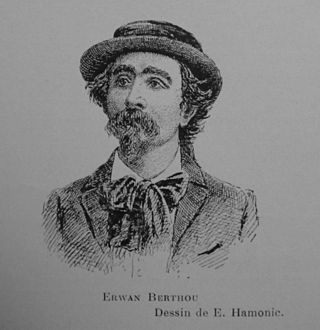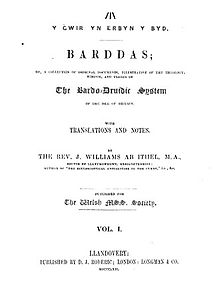
Hu Gadarn is a supposed Welsh legendary figure who appears in several of a series of Welsh Triads produced by the Welsh antiquarian and literary forger Iolo Morganwg. These triads, which Iolo put forth as medieval works, present Hu as a culture hero of the ancient Britons who introduced ploughing. However, it is now known that the triads, like all of the so-called "Third Series" of triads, were fabricated by Iolo himself. The name "Hu Gadarn" earlier appeared in a Welsh translation of a French romance about Charlemagne. Still, Iolo's version of Hu Gadarn was taken up in the 20th century by the poet Robert Graves, who associated him with other Celtic figures; since then he has been popular among neopagans.

Edward Williams, better known by his bardic name Iolo Morganwg, was a Welsh antiquarian, poet and collector. He was seen as an expert collector of Medieval Welsh literature, but it emerged after his death that he had forged several manuscripts, notably some of the Third Series of Welsh Triads. Even so, he had a lasting impact on Welsh culture, notably in founding the secret society known as the Gorsedd, through which Iolo Morganwg successfully co-opted the 18th-century Eisteddfod revival. The philosophy he spread in his forgeries has had an enormous impact upon neo-Druidism. His bardic name is Welsh for "Iolo of Glamorgan".
Rhun ap Maelgwn Gwynedd, also known as Rhun Hir ap Maelgwn Gwynedd, sometimes spelt as 'Rhûn', was King of Gwynedd. He came to the throne on the death of his father, King Maelgwn Gwynedd. There are no historical records of his reign in this early age. A story preserved in both the Venedotian Code and an elegy by Taliesin says that he waged a war against Rhydderch Hael of Alt Clut and the kings of Gododdin or Manaw Gododdin. The small scattered settlement of Caerhun in the Conwy valley is said to be named for him, though without strong authority. Rhun also appears in several medieval literary stories, as well as in the Welsh Triads. His wife was Perwyr ferch Rhûn "Ryfeddfawr" and their son was Beli ap Rhun "Hîr".
The "Druid's Prayer" or "Gorsedd Prayer" is a prayer composed by Iolo Morganwg which is still a staple in the ritual of both gorseddau and Neo-Druidism. Neo-Druids sometimes substitute the words y Dduwies for the original Duw ("God").
Awen is a Welsh, Cornish and Breton word for "inspiration" typically poetic inspiration).
John Williams, was an antiquary and Anglican priest. Born in Llangynhafal, Denbighshire Wales in 1811, he graduated from Jesus College, Oxford in 1835 to become the Anglican curate of Llanfor, Merionethshire, where he married Elizabeth Lloyd Williams. In 1843 he became perpetual curate of Nercwys, Flintshire, and rector of Llanymawddwy, Merionethshire, in 1849.
Côr Tewdws or Bangor Tewdws is a fictional Romano-British ecclesiastical college that in the 18th and 19th centuries was understood to have been the predecessor of the historically attested 6th century College and Abbey of Saint Illtud at what is now Llantwit Major in Glamorgan in Wales. The supposed Roman college is believed to have been invented by the historian of ill-repute, Edward Williams, more generally known as Iolo Morganwg.

Erwan Berthou was a French and Breton language poet, writer and neo-Druidic bard. His name is also spelled Erwan Bertou and Yves Berthou.

Welsh-language literature has been produced continuously since the emergence of Welsh from Brythonic as a distinct language in around the 5th century AD. The earliest Welsh literature was poetry, which was extremely intricate in form from its earliest known examples, a tradition sustained today. Poetry was followed by the first British prose literature in the 11th century. Welsh-language literature has repeatedly played a major part in the self-assertion of Wales and its people. It continues to be held in the highest regard, as evidenced by the size and enthusiasm of the audiences attending the annual National Eisteddfod of Wales, probably the largest amateur arts festival in Europe, which crowns the literary prize winners in a dignified ceremony.
The Myvyrian Archaiology of Wales is a printed collection of medieval Welsh literature, published in three volumes by the Gwyneddigion Society between 1801 and 1807. Until John Gwenogvryn Evans produced diplomatic editions of the important medieval Welsh manuscripts, the Myvyrian Archaiology provided the source text for many translators of medieval Welsh material. It was founded, and funded, by Owen Jones, who engaged William Owen Pughe as editor, and Edward Williams, better known as Iolo Morganwg, to search Wales for manuscripts.
Jean Le Fustec was a Breton bard, and the first Archdruid of the Goursez Vreizh. He is also known by his Breton language name Yann ab Gwilherm and his Druidic name Lemenik.
Cyllin was a legendary, and possibly historical British king of the 1st century AD, early Christian saint and the last pendragon of Great Britain. His existence is based on very limited evidence. Richard Williams Morgan claimed that a reference to him as a son of Caratacus was found in the family records of Iestyn ab Gwrgant and used this as evidence of early entry of Christianity to Britain;
Cyllin ab Caradog, a wise and just king. In his days many of the Cymry embraced the faith in Christ through the teaching of the saints of Cor-Eurgain, and many godly men from the countries of Greece and Rome were in Cambria. He first of the Cymry gave infants names; for before, names were not given except to adults, and then from something characteristic in their bodies, minds, or manners.
Taliesin Williams was a Welsh poet and author, and son of the notable Iolo Morganwg.

Raglan Library was a library located in Raglan Castle in the county of Monmouthshire in south east Wales.

The Coelbren y Beirdd is a script created in the late eighteenth century by the Welsh antiquarian and literary forger Edward Williams, best known as Iolo Morganwg.
The Welsh Manuscripts Society, also known as the Society for the Publication of Ancient Welsh Manuscripts, was an organisation formed in Abergavenny, Wales, in 1837.
Meurig Dafydd was a Welsh bard, genealogist and historian, at one time one of the leading literary figures in Glamorgan. However, his poetry was formal and uninspired.
Edward Dafydd, also known as Edward David, was a 17th-century Welsh poet from Margam, Glamorganshire.

Evan Davies, also known by his bardic name Myfyr Morganwg was a Welsh bard, druid and antiquarian.








